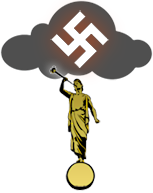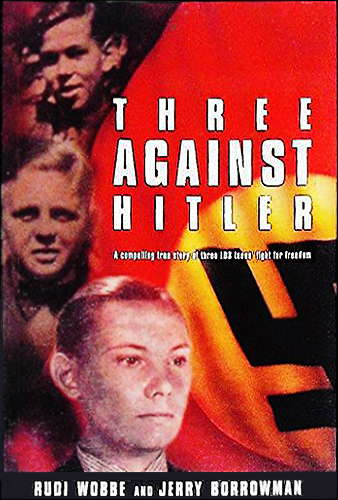A compelling true story of three LDS teens' fight for freedom.
"Rudi Wobbe: Charged with Preparation to High Treason and Aiding and Abetting the Enemy."
Thus began the trial of Rudi Wobbe and two of his teenage friends as they stood before the justices of the dreaded Voksgerichtshof, the infamous supreme court of Nazi Germany. All the power and indignation of the Third Reich now focused on these three young men who dared to distribute the truth about the war to their neighbors. If found guilty, they faced imprisonment, and perhaps even death.
Why did they do it? Because the teachings of their parents and the Church taught them to respect individual liberty and to rely on their conscience in choosing between right and wrong. Now their naive confidence was shaken by the torture they'd endured at the hands of the Gestapo. Yet, their brilliant young leader, Helmuth Huebener, whose intelligence and conviction stood out like a beacon of truth in the oppressive courtroom, faced his accusers with confidence. It was his finest moment ... would it be his last?

Mormons under the Third Reich...
During the 1920s and early 30s the German missions of the Church of Jesus Christ of Latter-day Saints (LDS or Mormon) experienced unprecedented success. When the Nazis came to power in 1933, Church membership in Germany had grown to over 12,000, the largest pocket of Mormons outside the US.
The Church was never officially banned in Germany as some other religious groups were, most noticeably the Jehovah's Witnesses. To the contrary, the Church received rater favorable treatment from the Nazi government; although Gestapo agents did frequently observe Church meetings, and most local leaders were thoroughly interrogated about Mormon doctrine, beliefs and practices. But as long as they didn't overtly cause trouble, the Third Reich tolerated Latter-day Saints in much the same way it tolerated Baptists and Methodists. All were warned, however, to stay out of political matters and by 1935 were all forced to drop their Scouting and youth programs, replacing them with the state-mandated Hitler Youth.
Because the Nazis emphasized racial purity, they promoted genealogical research. Government officials, who had earlier regarded the Mormons as an unpopular sect and thus denied them access to vital records, now respected them because of their interest in genealogy. Nevertheless, the situation for the Church and its members became much more difficult during the late 1930s.
When the LDS Church eventually ordered the evacuation of all non-German missionaries and leaders in 1939, the local Saints were left on their own in isolated circumstances for the next six years. Some German Mormons felt that the wisest course was to cooperate with the Nazis as much as possible. Others were convinced that their patriotic and religious duty was to resist, which became increasingly difficult to do.
Soon, numerous German male members, both single and married, were drafted into the German armed forces. In the early months of the war, most of the German Saints felt they were fighting a just war, but as the war lengthened and rumors of atrocities heightened, more and more members of the Church began hoping and praying for an Allied victory. After America's entry into the war, some 100,000 American Mormons found themselves in uniform as well, and German Mormons were faced with the unsettling, yet very real possibility of having to confront their fellow Saints on the battlefield.
Perhaps the greatest difficulty for German Mormons centered around the Church's 12th Article of Faith, "We believe in being subject to kings, presidents, rulers, and magistrates, in obeying, honoring, and sustaining the law." Obedience to the law under Nazi rule was increasingly becoming in stark contrast to their principles of moral conduct. Their only options were silence and turning a blind eye to events all around them, just as faced by Germans of other denominations.
All German religious groups tolerated under the Third Reich shared an unspoken understanding that once the Jews had been eliminated, they would eventually be next.
Related Scanning WWII links...
- 27 Oct 42: 17-year old German boy beheaded for circulating anti-Nazi leaflets in Hamburg
Related WWII Store items...
- Hubener vs Hitler:
A Biography of Helmuth Hubener - Brothers in Valor:
A Story of Resistance - Three Against Hitler:
A Compelling True Story of Three LDS Teens' Fight for Freedom - Shades of Gray:
Memoirs of a Prussian Saint on the Eastern Front - Moroni and the Swastika:
Mormons in Nazi Germany
![]()



